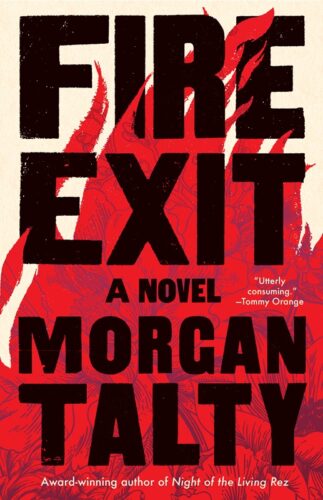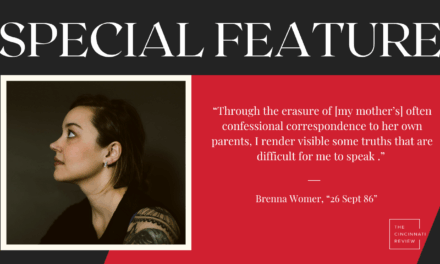9 minutes read time

To accompany our spring 2025 issue (22.1), we have curated a folio on family secrets (reviews and craft essays), after noticing that several pieces in the print issue include that theme. Here is Jessica E. Johnson’s review of a novel:

Knowledge and Responsibility: A Review of Morgan Talty’s Fire Exit
Fire Exit. Morgan Talty. Tin House, 2024. 256 pp. $28.95 (paper)
As a poet who attempts short and long prose genres, I’ve spent time thinking about my relationship to stories and their lived and learned forms. In addition to classroom-style plot diagrams, books of story-craft, and dictums in social media posts lie childhood memories of listening to women around tables sharing, often in veiled ways, the weight of their lives. Through these intimate forms of discourse, we come to know the world and each other. By observing closely, we may notice categories of information that shape families, even if they’re not publicly acknowledged.
Just as I long for poems that carry the wisdom and surprise of my friends’ verbal play, I hope for novels that are absorbing, like a long conversation with a friend can be absorbing when she is getting closer and closer to the heart of the matter—a novel that is engaging for the reasons and in the ways that lives are engaging. I’m drawn in by an event-filled plot as much as the next person, but I long for a novel that holds something more like an extended crux, developing all that surrounds it before possibly relieving the tension.
Morgan Talty’s Fire Exit (Tin House, 2024) is such a novel, and the crux comes in the form of a family secret. Though Talty reveals the secret to the reader from the beginning, and though there is some mild narrative suspense around the protagonist’s decision to reveal it, the novel’s real action is close to the rhythms of life, moving in deepening circles around the secret and what it implies about identity, belonging, and responsibility.
We know from the opening lines of Fire Exit that the protagonist, Charles Lamosway, keeps the secret of his paternity from the young woman, Elizabeth, whom he fathered decades earlier. Charles describes his desire for the secret to come out in nearly ontological terms: “I wanted her to know who I was—who I really was—instead of a white man who had lived across from her all her life and watched her grow up from this side of the river.” In fact, whatever he might long for, he is both her biological father and exactly that white man. He speaks of the secret as if he wants the firmer understanding of self that might come from relationship and responsibility, maybe more than he wants Elizabeth to know about her parentage for her own benefit. Charles downplays it, but the novel makes clear that knowing might do Elizabeth more harm than good. The secret is connected to a responsibility that he doesn’t know how to carry.

Fire Exit reveals the implications around Charles’s secret by inhabiting his perspective, following him on spatial and narrative meanders through the quotidian dilemmas of intergenerational care, and by showing other characters’ reactions to him. As a generally well-intentioned Charles checks on his deteriorating mother, meets up with a still-drinking buddy from AA, and tries to keep track of Elizabeth’s movements, he recounts scenes from his childhood on the Penobscot reservation and half-heartedly entertains thoughts of leaving rural Maine for a warmer climate. His particular and recognizably rural kind of stasis arises through contemplation and withholding; we can see the knowledge of his paternity giving his life a kind of narrative meaning, at least in his own mind—“who I really am”—even if his care for Elizabeth is not material.
Charles’s inertia is also the product of his personal history and political circumstances, the problem in which his secret is embedded. He emerges as a character frozen between generations, having grown up into a structural form of unbelonging. Born to a white depression-prone mother and a father he can’t remember, he has been raised mostly by his Penobscot stepfather, Frederick. During Charles’s childhood, the Penobscot tribe regains legal sovereignty and, with it, the ability to pass laws. As the tribe decides land rights, membership, and governance, they come to use the colonial construct of blood quantum as the measure of who can reside on the reservation. Frederick opposes this decision but ultimately loses; it will mean that Charles, not Native and not married-in, must leave the reservation when he turns eighteen. It will also mean that Elizabeth’s mother, Mary, sees no choice but to hide Charles’s paternity and marry an enrolled Penobscot man when she becomes pregnant, so her daughter can be an enrolled tribal member. Elizabeth enters the world as Frederick exits. For Charles, a connection is replaced with adjacency and obscurity.
Even in memory, Frederick remains a uniquely stable figure. When Charles comes of age, Frederick sells land and buys a parcel just off the reservation so he and Charles can build a house together. When Charles tries to repay him, Frederick tells him, “It’s what a father does.” From the small, undecorated dwelling, Charles smokes and watches Elizabeth. He shelters in the legacy of a man who had a clear sense of his identity and responsibilities, but Charles is unable to move into his own.
As he goes about his life—a life increasingly revealed as hardened around the secret he holds and periodically returns to—Charles talks about wanting Elizabeth to know about the larger story her existence belongs to. One piece of this story is his mother’s deep and frequent periods of depression, which affected her ability to care for Charles and which he suspects Elizabeth herself may now be experiencing.
After a period of estrangement between him and Louise, his aging mother, Charles tends to her, taking her to appointments, attempting to assess her condition, and maintaining her frequently poor health, while making sure she can remain independent. He wants her to be all right, but who’s to say what that looks like when she hasn’t been all right for most of her life, and when Charles doesn’t care for himself particularly well. Charles’s need to orbit Elizabeth often draws him away from his responsibilities to Louise, as he was drawn away from his responsibility to accompany Frederick on his last hunting trip. Talty shows a complex interpersonal dynamic around the secret and the way its promise of change allows Charles to avoid, on a daily level, facing tasks and relationships that require his presence.
The story of Louise and the story of Elizabeth come together in one inspired object that Talty carries from the beginning to the end of the novel: a stuffed elephant that then-drinking Charles tried to give Elizabeth upon their only meeting when she was a toddler. He picked it out unaware that the sound it made would scare rather than amuse her. Mary seems to have taken this failure as a sign that it would be a bad idea for Charles to know Elizabeth. She handed the elephant back to Charles and has kept Elizabeth away thereafter. But Louise, in her dementia, attaches to the elephant and carries it like a baby, guarding it fiercely. When Louise and Elizabeth are both undergoing mental health treatment and wind up in the same waiting rooms, unaware that they’re grandmother and granddaughter, the elephant is there, with only Charles and Mary in on the secret story of which it is part.
An inherited story, public or obscure, is one aspect of identity, the “who I am” for Charles in the book’s opening lines; another aspect is what one experiences, remembers, and chooses. Being a parent means living between past and future generations and reckoning with multiple ways of understanding what makes us who we are. It’s a position that highlights the complex roles behind what we inherit, what we experience, and how we play the hand we’re dealt. To the novel’s credit, Fire Exit gives weight to the story we’re part of but also the ways we care for each other.
Throughout the novel Charles often avoids confronting the secret by taking care of his mother; reciprocally, his preoccupation with the secret sometimes inhibits that care. The family secret at the heart of the novel is embedded in a cycle of avoidance that often manifests materially in the setting of Louise’s apartment and in Charles’s own neglected house. Given its centrality to so many lives, care-work is underdramatized in literature and film. Through its attention to the material and emotional movements of working-class caregiving—the tightrope act of picking up prescriptions, taking people to appointments, washing soiled laundry, bonding with people we desperately want to love us, and balancing all this with day jobs—Fire Exit builds the right kind of stakes around the family secret. How do we hold and deploy our inherited stories? What does “blood” mean? How do we balance the needs of those who came before us and those who will come after? How do we understand ourselves within this matrix? How do we take responsibility for the knowledges we carry?
In the end, Charles does not magically become anyone’s father—not in the sense that Frederick was his. It was Frederick’s daily love that told Charles who he was, anchoring him to people and place. Elizabeth, on the other hand, responds to Charles’s concern with some of Fire Exit’s truest words: “You should stop worrying about me and start worrying about yourself.” Who could Charles be to Elizabeth but the white man who lived across the river and watched her grow up? In one sense, Charles must face who he is and who he has been. In another sense, though, the characters alive at the end of the book can begin enacting intergenerational responsibility with Charles as a participant rather than a self-destructive onlooker. The novel’s arc suggests the possibility of breaking patterns and moving forward in better ways.
Jessica E. Johnson (she/they) is the author of the book-length poem Metabolics (Acre Books, 2023), the chapbook In Absolutes We Seek Each Other (New Michigan Press, 2014), and the memoir Mettlework (Acre Books, 2024).










